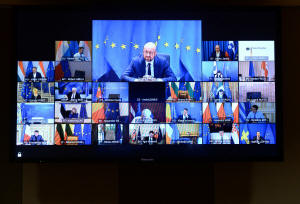|
Ahead of the summit, French President Emmanuel Macron spelt out
the frustration over vaccine rollouts that are far behind those
of Britain and the United States, acknowledging that European
leaders had been too timid.
"We didn't shoot for the stars. That should be a lesson for all
of us. We were wrong to lack ambition, to lack the madness, I
would say, to say: It's possible, let's do it," he told Greek
television channel ERT.
As of March 23, Britain had administered nearly 46 vaccines for
every 100 people, whereas the 27-nation bloc it left last year
had administered 13.8 shots per 100 people, according to public
data compiled by Our World In Data website.
Europe's painfully slow rollout has led to a quarrel with
Britain, which has imported at least 11 million doses made in
the EU. Britain says it did a better job negotiating with
manufacturers and arranging supply chains. The EU says it should
share more.
German Chancellor Angela Merkel, under pressure at home after
making a U-turn on plans for an extended Easter holiday to break
a third wave of COVID-19, defended the EU's decision to procure
vaccines jointly for all member states.
"Now that we see that even small differences in the distribution
of vaccines cause big discussions, I would not like to imagine
if some member states had vaccines and others did not," she told
German lawmakers ahead of the summit. "That would shake the
internal market to its core."
Several countries have complained that vaccines are not being
distributed evenly across the bloc.
TENSIONS WITH UK
The EU's executive unveiled plans on Wednesday to tighten
oversight of vaccine exports that would allow greater scope to
block shipments to countries with higher inoculation rates.
Despite that, Brussels and London sought to cool their tensions
on Wednesday, declaring in a joint statement that they were
"working on specific steps we can take ... to create a win-win
situation and expand vaccine supply for all our citizens".
The EU is not united on the European Commission's proposals on
vaccine exports, and several countries - including Belgium the
Netherlands, Ireland, Sweden and Denmark - have reservations.
"If we need to have this because one supplier is not delivering
then I hope this is a stick which does not have to be used
because it might turn out to be a lose-lose," said one EU
diplomat. "If we hamper supply chains, the risk is that we will
all be left without the vaccines we desperately need."
Although the Commission's plan will be discussed at the summit,
which gets underway by video-conference at 1200 GMT, it is not
likely to be explicitly endorsed by the leaders.
A draft of the summit conclusions seen by Reuters said on
vaccines that leaders would stress "the importance of ... export
authorisations", and reaffirm that vaccine producers must be
respect contractual delivery deadlines.
However, diplomats said countries with misgivings about a
tougher stand on exports would not put up strong resistance.
"Their message is ... please act very cautiously, in a very
balanced way," said one EU diplomat. "But there is nobody who
says don't do it."
U.S. President Joe Biden will join the leaders briefly at around
1945 GMT, which EU officials said would be an opportunity to
discuss the pandemic but also the warming of transatlantic
relations, which soured under former President Donald Trump.
(Additional reporting by Philip Blenkinsop; Writing by John
Chalmers, Editing by William Maclean)
[© 2021 Thomson Reuters. All rights
reserved.] Copyright 2021 Reuters. All rights reserved. This material may not be published,
broadcast, rewritten or redistributed.
Thompson Reuters is solely responsible for this content.

|
|




